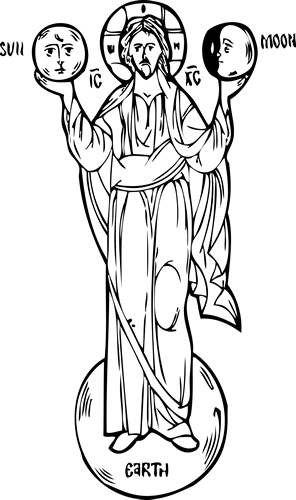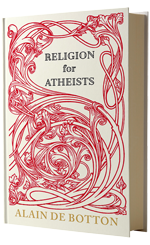|
|||
|---|---|---|---|
| This weekly bulletin insert complements the curriculum published by the Department of Christian Education of the Orthodox Church in America. This and many other Christian Education resources are available at http://dce.oca.org. | |||

The book "Religion for Atheists" by Alain de Botton is subtitled "A Non-Believer's Guide to the Uses of Religion." The author sees value in the forms and practices of various religions, but not in their content, which is faith and worship. So he proposes that many of those forms and practices should be retained, because they offer comfort and give structure to life. But, as an atheist, he says that their content should no longer be praise and worship of God. One example he offers is to create restaurants with tables at which people would sit with strangers and share a meal. Then they would discuss deep questions such as, "What do you fear?" and "Whom can you forgive?" This experience would retain two admirable forms: the shared meal of the Eucharist, and the cleansing ritual of confession of sins. But it would replace their religious content with secular content acceptable to non-believers. De Botton writes that "the starting point of all religions is that humans are weak and vulnerable and needing direction." This statement reflects a basic premise of atheism: that religion is invented by human beings to comfort each other, to give moral guidance, and to explain things that are impossible to explain or justify. Atheism sees no divine presence working in the world; standards and ideals are created by people. But II Peter 1: 3-4 reveals the Church's teaching about the source of these standards and ideals: "His divine power has granted us all things that pertain to life and godliness, through the knowledge of Him who called us to His own glory and excellence, by which He has granted to us His very great promises, that through these...you may become partakers of the divine nature." 
As these words from Scripture tell us, the starting point of Christianity is not that we are "weak and vulnerable." The starting point is that God wants to give us "glory and excellence." He offers us the chance to become "partakers of the divine nature." Free and forgetful creatures that we are, we need the rituals and practices of the Church as encouraging reminders of our high calling. Christians would be adamant in saying that to empty the Church's practices of their religious content, and insert human-made ideas instead, would be to rob all of us of the greatest gift we have been given. De Botton says this about human freedom: "Real freedom does not mean being wholly left to one's own devices; it should be compatible with being harnessed and guided." This sounds suspiciously--for an atheist--like Saint Paul's statement that we should be "slaves of God" (Romans 6: 22). Paul believes that this slavery is the greatest freedom, in fact the only freedom, because nothing else can lead us to "eternal life in Christ Jesus our Lord." Whatever de Botton believes his "real freedom" will lead us to, he seems to have more in common with Saint Paul, whom many atheists abhor, than he realizes. |
|||
